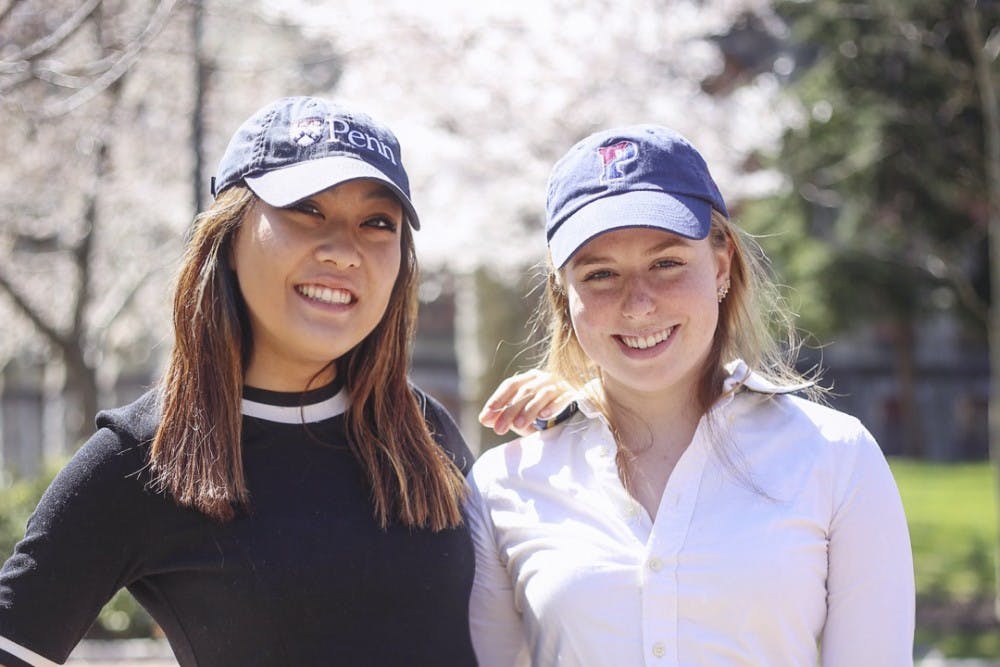
On April 1, Kat McKay and Sola Park were elected as the new president and vice president of the Undergraduate Assembly. They hope to bring greater attention to mental health and sexual assault and to address the annual tuition increase. | Courtesy of Isabella Cuan
On April 1, College junior Kat McKay and College sophomore Sola Park were elected as the new president and vice president of the Undergraduate Assembly, respectively. The Daily Pennsylvanian sat down with McKay and Park to discuss what they hope to bring to the 44th UA session in 2016-17 and what they hope to accomplish by the end of their term.
Daily Pennsylvanian: What has been your past experience with the UA?
Kat McKay: I was elected to the UA for the first time in my freshman fall and have been on it since then. [This year] I was UA Treasurer, so I proposed a $2.3 million budget for all student activities for 2016-17, and as an extension of that, I was one of the nine executive board members for the Student Activities Council. So I had UA meetings five or six days a week this year, and I do not think [being] president will be more time consuming.
Sola Park: I was also elected freshman fall. I was on the Social Justice Committee in my freshman year and I’m still on that committee as a sophomore. I was the Communications Director [this year]. I led a team of three and we mostly focused on internal and external communications.
DP: What made you decide to run this year for president and vice president?
KM: I decided to run because after three years of observing other people, I felt like I had a good understanding of the system and a good understanding of what initiatives students care most about. I feel like I have a good grasp of the pulse of the student body and I also felt qualified.
SP: I decided to run for VP specifically because the role really excited me, since I would be in charge of UA Steering, which is about bringing together a lot of people and that’s something I like doing personally. The reason I ran in my freshman year was because the president at the time, Joyce Kim, was such an inspiration to me. Seeing her leadership and Josh Chilcote’s, the VP at the time, excited me about the things I could achieve as a student. Seeing this year’s leadership, it was very different from last year’s: the vibe was very different, the ambiance between the people, the committees and the social bonds was all very different from what I first thought it would be.
DP: Can you elaborate on what you mean by this year’s change of atmosphere within the UA?
KM: Every year it’s different. This year it’s been the most casual. The organization used to be so much more formal; we sat in hierarchical order in UA meetings and we had to present at the podium. It was a very different dynamic that I liked a lot. Next year I just want people to feel that their time in the organization is worthwhile and that they achieve something substantial on a weekly basis.
DP: What do you hope to achieve in the next UA session?
KM: It’s challenging to put a timeline on our projects but I care a lot about this annual tuition increase. I think it’s a crisis that faces higher education in this country in general, and it’s been talked about in Washington, talked about in think tanks — and now it’s time for it to be talked about between students and administrators at the university level. Mental health and wellness is a big deal; one of the ideas on our platform was to create a six-month mental health leave because currently the University policy is inconsistent about whether or not you can take only a semester or a whole year off. Some projects are more feasible ... for example we talked about designing an introductory computer science class because CIS 110 is prohibitively time consuming and a lot of people won’t take it as an elective. Designing half-credit classes is also something else we want to work with with the Student Committee on Undergraduate Education.
SP: I’m personally passionate about social justice, so it’s a huge field that I can incorporate into different projects. One idea I had for dealing with sexual assault is using UA Legal Services to cater to sexual assault victims and survivors of any interpersonal violence. During campaigning, a lot of the Steering groups I met with also talked about how issues like sexual assault don’t just concern one group, so I want to increase collaboration and communication. Relating to mental health, I want to showcase the different resources we have at CAPS that cater to different nationalities, ethnicities, gender identities ... a lot of this is not well known at Penn.
This transcript has been lightly edited for clarity.
The Daily Pennsylvanian is an independent, student-run newspaper. Please consider making a donation to support the coverage that shapes the University. Your generosity ensures a future of strong journalism at Penn.
DonatePlease note All comments are eligible for publication in The Daily Pennsylvanian.




